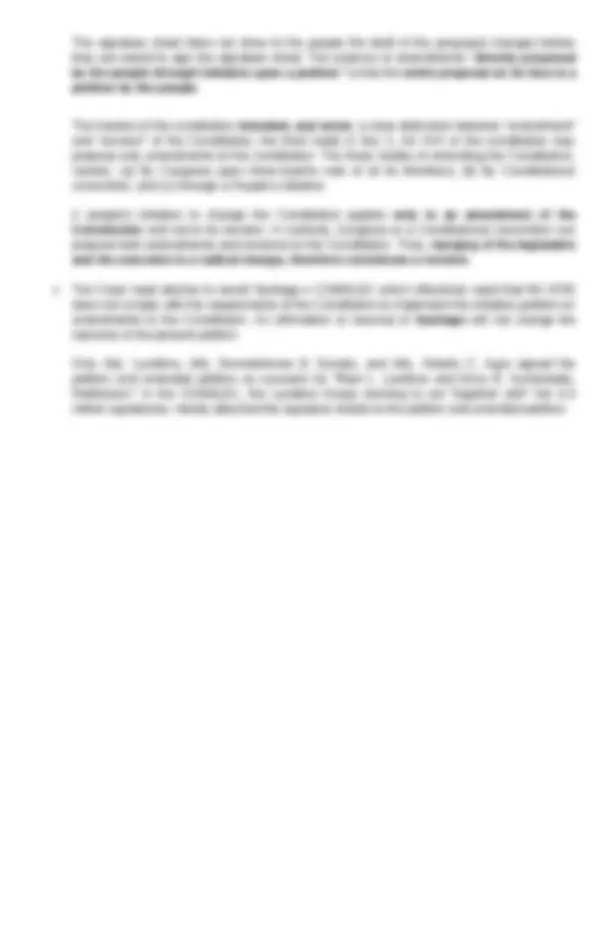



Study with the several resources on Docsity

Earn points by helping other students or get them with a premium plan


Prepare for your exams
Study with the several resources on Docsity

Earn points to download
Earn points by helping other students or get them with a premium plan
Community
Ask the community for help and clear up your study doubts
Discover the best universities in your country according to Docsity users
Free resources
Download our free guides on studying techniques, anxiety management strategies, and thesis advice from Docsity tutors
This is about the case of Lambino vs. Commission on Elections
Typology: Assignments
Uploaded on 01/23/2021
4.8
(8)13 documents
1 / 2

This page cannot be seen from the preview
Don't miss anything!


No: G. R. No. L- Date: October 25, 2006 Ponente: Justice Antonio Carpio Petitioners: Raul L. Lambino, et.al Respondent: COMMISSION ON ELECTIONS FACTS Lambino et al filed a petition with the COMELEC on August 25, 2006, to hold a plebiscite that will ratify their initiative petition to change the 1987 Constitution under Section 5(b) and (c) and Section 73 of Republic Act No. 6735 or the Initiative and Referendum Act. The petitioners gathered signatures for an initiative petition to change the 1987 Constitution. The proposed changes under the initiative petition modifies Article VI (Legislative Department), Article VII (Executive Department) and addition of Article XVIII entitled “Transitory Provisions.” which will shift the present Bicameral-Presidential system to a Unicameral-Parliamentary form of government. The Lambino Group alleged that the 6.3 Million signatures gathered constituted at least 12 percent of all registered voters, with each legislative district represented by at least 3percent of its registered voters. The petitioners also claimed that COMELEC election registrars had verified the signatures of the 6.3 million individuals. On August 30, 2006, the Lambino Group filed an Amended Petition with the COMELEC indicating modifications in the proposed Article XVIII (Transitory Provisions) of their initiative. The COMELEC denied the Lambino petition and invoked the ruling in Santiago v. Comelec declaring RA 6735 inadequate to implement the initiative clause on proposals to amend the Constitution. ISSUES WON the petitioners comply on Amendments through people’s initiative; WON this Court should revisit its ruling in Santiago v COMELEC. RULING The Lambino Group's initiative is void and unconstitutional because it does not comply with the requirement of Section 2, Article XVII of the Constitution that the initiative must be " directly proposed by the people through initiative upon a petition ." Section 2, Article XVII of the Constitution is the governing constitutional provision that allows a people's initiative to propose amendments to the Constitution. It states: Sec 2. Amendments to this Constitution may likewise be directly proposed by the people through initiative upon a petition of at least twelve per centum of the total number of registered voters of which every legislative district must be represented by at least three per centum of the registered voters therein. The petitioners failed to show the court that the initiative signer must be informed at the time of the signing of the nature and effect, failure to do so is “deceptive and misleading” which renders the initiative void. The Lambino Group merely submitted a copy of the signature sheet.
The signature sheet does not show to the people the draft of the proposed changes before they are asked to sign the signature sheet. The essence of amendments " directly proposed by the people through initiative upon a petition ” is that the entire proposal on its face is a petition by the people. The framers of the constitution intended, and wrote , a clear distinction between “amendment” and “revision” of the Constitution, the third mode in Sec 2, Art XVII of the constitution may propose only amendments to the constitution. The three modes of amending the Constitution, namely: (a) By Congress upon three-fourths vote of all its Members; (b) By Constitutional convention; and (c) through a People's initiative. A people's initiative to change the Constitution applies only to an amendment of the Constitution and not to its revision. In contrast, Congress or a Constitutional convention can propose both amendments and revisions to the Constitution. Thus, merging of the legislative and the executive is a radical change, therefore constitutes a revision. The Court must decline to revisit Santiago v COMELEC which effectively ruled that RA 6735 does not comply with the requirements of the Constitution to implement the initiative petition on amendments to the Constitution. An affirmation or reversal of Santiago will not change the outcome of the present petition. Only Atty. Lambino, Atty. Demosthenes B. Donato, and Atty. Alberto C. Agra signed the petition and amended petition as counsels for "Raul L. Lambino and Erico B. Aumentado, Petitioners." In the COMELEC, the Lambino Group claiming to act "together with" the 6. million signatories, merely attached the signature sheets to the petition and amended petition.